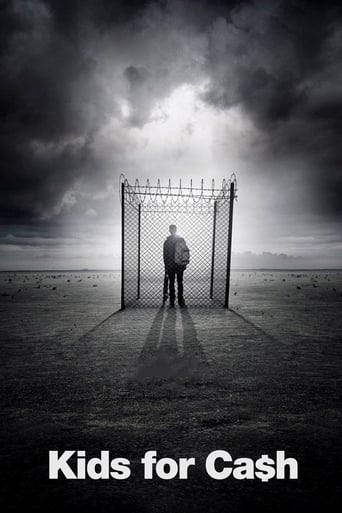MartinHafer
The story about two judges in Northeast Pennsylvania destroying lives is a very compelling story. However, how the film told this story left me rather cold for a variety of reasons. The story focuses mostly on Judge Ciavarella--a judge known for throwing the book (so to speak) at kids with minor offenses as well as, reportedly, sending kids to a juvenile detention facility in which he had a financial interest. In essence, folks said he was getting cash for sending kids there. It also talks, to a much lesser extent, on another judge, Michael Conahan. Both admitted to taking money from this private juvenile prison--but both make a wide variety of excuses for what they did.So why didn't I like the documentary more? Well the biggest problem is that the film allowed Judge Ciavarella way too much time...way too much. While he admitted to 'making mistakes', he mostly just made excuses and tried to talk his way out of actions that clearly were NOT ethical or legal. But by allowing him so much time and by allowing him to say things often unchallenged tended to seriously diminish from the message--such as 'I wasn't as bad as they say'. He was a judge for goodness sake and he sentenced children to prison with reckless abandon! The story clearly would have been much stronger had they given more than just a small number of cases where the judge seemed to have overstepped reasonable sentencing to show more of a pattern. The cases they gave were pretty egregious--kids who should have, at most, received minor suspensions being sent away for years! So quibbling about did he or did he not get paid for each kid he sent is a real distraction--he did destroy some kids who clearly were not yet delinquents and this should have been more the focus. After all, 2480 juvenile cases have SINCE been overturned or expunged! THAT should have been the point--driven home again and again.The bottom line is that a documentary should galvanize the audience towards or against something--this one just left you feeling a bit ambivalent. I could see some watching this and thinking the judges weren't all that bad! With 15 and 28 year sentences, I'd say that's really BAD.By the way, I did like the music.
zippyflynn2
Take a good look at this film and be prepared to be shocked and angry. Very shocked and very angry, that is, if you believe in decency and justice. It's an intimate look at two judges who took bribes to send children to jail, often for non-existent crimes or for petty, relatively insignificant things kids do because they're kids. Some of these children committed suicide, the rest all had their lives ruined. And the sick punchline? The crooked judges don't see what they did as wrong but rather just "administrative decisions". Sure, the judges went to jail but I'm sure they just see that as an "administrative decision" as well. Look at them closely. They're faces of the banality of evil. Much like the Nazis operating the death camps during WWII, they justify their actions as merely methods of the time. One of the criminals portrayed, the pompously righteous Judge Ciavarella pretended to be a "law and order" judge when in fact he was a greedy sociopath, not much different than the death camp dentists who ripped the gold teeth from Jews for joyful profit.But whatever you do, don't see this as an isolated incident that has been taken care of. It still exists today. Most Americans are oblivious to the Prisons for Profit system, the same system that was giving huge kickbacks to these judges to incarcerate children for greed. The real sick thing about this documentary? The Prisons for Profit not only still exist, they're bigger than ever. And the terrible punchline to this story? You likely won't ever hear about judges being arrested for getting kickbacks for sentencing children to jail anymore. Now they can legally own stock and have other financial interests in this Prisons for Profit system that is flourishing. The same prisons they sentence "offenders" to serve long, profitable sentences. The fastest growth industry in the last 30 years in America. And most Americans are still oblivious to it. Your legal system has been sold, America and the blood, sweat, tears, and lives of your children and others who shouldn't be jailed will continue to line the pockets of evil people like these two judges who only saw children as a way to make money, caring not for their ruined - and ended - lives.Watch this and get angry, very angry. And start talking about the evil that is destroying what used to be a somewhat fair legal system. That is, if you care at all about justice and decency. And your country. And your fellow men, women and children.
Michael Radny
Kids for Cash is a documentary that shows the horrific miss sentencing of several young American kids as a ploy for the judges receiving cash in hand by sending these kids to private detention centres. Throughout the documentary you can't help but feel for these kids who have had upwards of seven years of their life thrown away due to greed and selfishness of the authority figures. Though the documentary travels on both sides of the fence (between the judges fault and not the judges fault) the bulk of the film views the head judge as this overly conservative man who has only his own interests in hand. One great documentary and never gets boring. Though the documentary will polarise views of the situation, anyone who is interested in this case will be glad they had watched this gem.
Walt-Most
This is a beautifully made film about the huge judicial scandal that became known as "kids for cash." Basically, two judges in Pennsylvania secretly received millions of dollars from the owners of a for-profit prison for juveniles in their jurisdiction, while at the same time pulling strings to give the prison a monopoly on juvenile detentions and (in the case of one of the judges) sentencing hundreds (literally, hundreds) of juveniles to years of incarceration in the same prison, without due process and often for truly minor misbehavior.The documentary tells its story through interviews, news footage, and a limited number of title cards. There is no narrator, and the voice(s) of the interviewer(s) are not heard. The focus is on five of the hundreds of teenagers who were imprisoned in this scam: Charlie Balasavage, Justin Bodnar, Hillary Transue, Edward Kenzakoski, and Amanda Lorah. The interviews with the victims are heartbreaking. We also hear from the two judges (Ciavarella and Conahan), who allowed themselves to be interviewed for the film while the federal cases against them were pending. In some ways, this footage, while infuriating to watch, was the most interesting aspect of the film. Among the other interviewees are Terrie Morgan, the reporter who mainly covered the scandal for the Wilkes-Barre Times Leader (and who serves as a de facto narrator), and Marsha Levick and Robert Schwartz, two attorneys with the non-profit Juvenile Law Center who worked to have the cases affected by the scandal vacated.The events covered here present dangerously rich material for a filmmaker. Should the story be about money? About power? About the juvenile justice system in general? The one weakness of the film is that it moves around among all of these themes without clearly digging into any of them. The opening and closing title sequences suggest that the third, broadest theme is the focus. But if so, why use the damage caused by two judges who were clearly corrupt as the vehicle?Despite that flaw, the film deserves 8 stars for its excellent production values and, most of all, the powerful interview footage, which brings home the effects the scam has had on so many lives.


